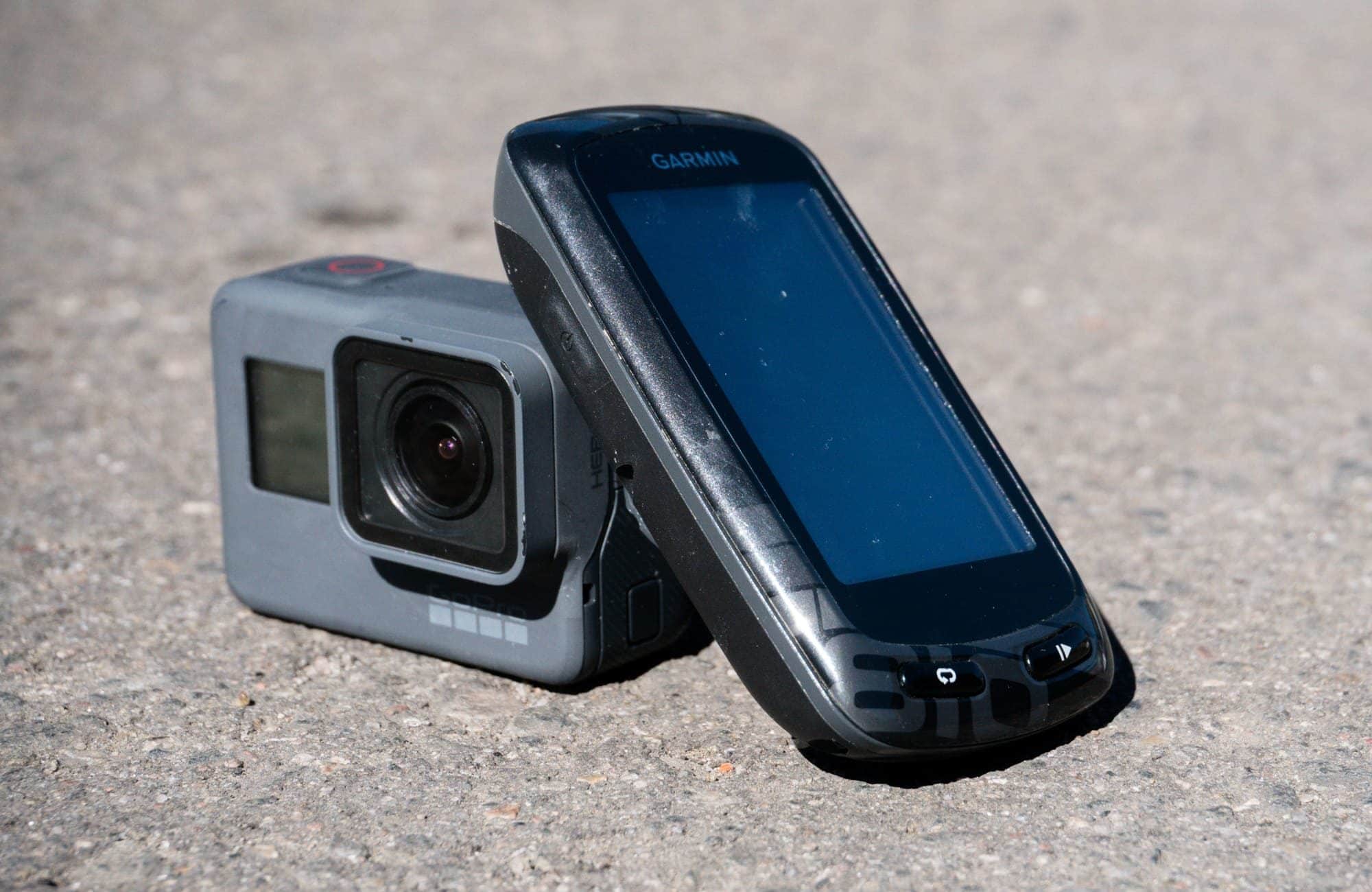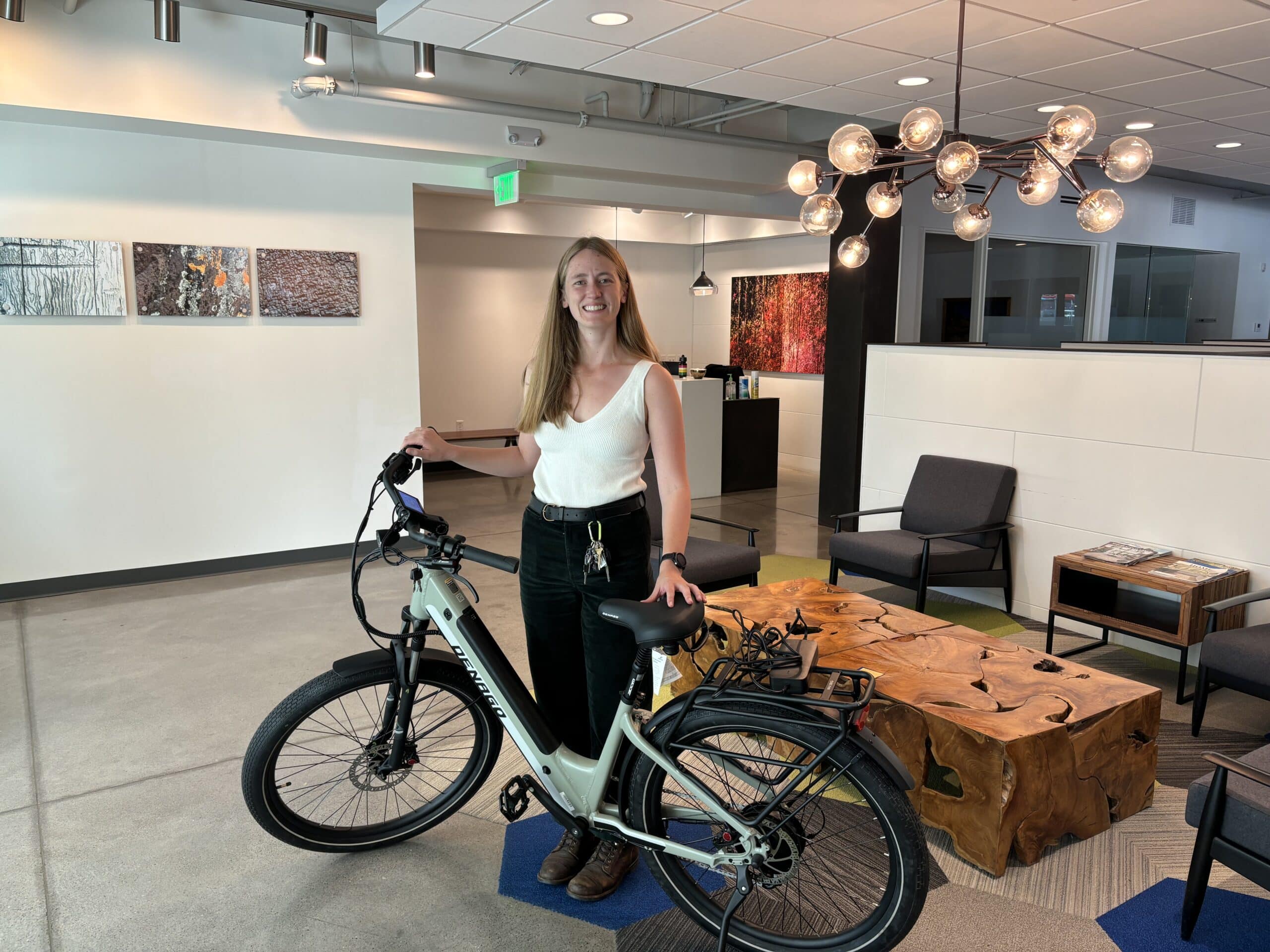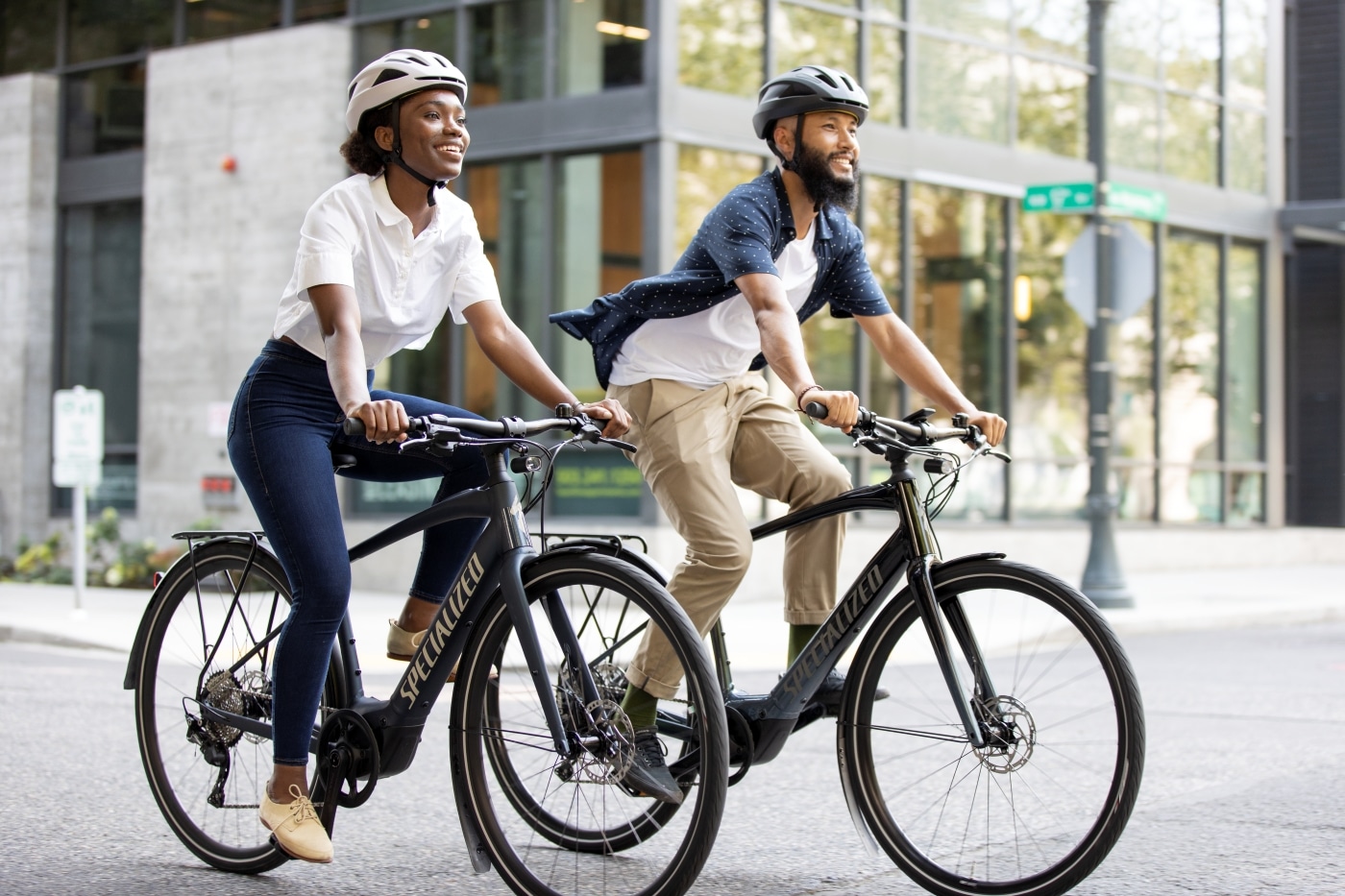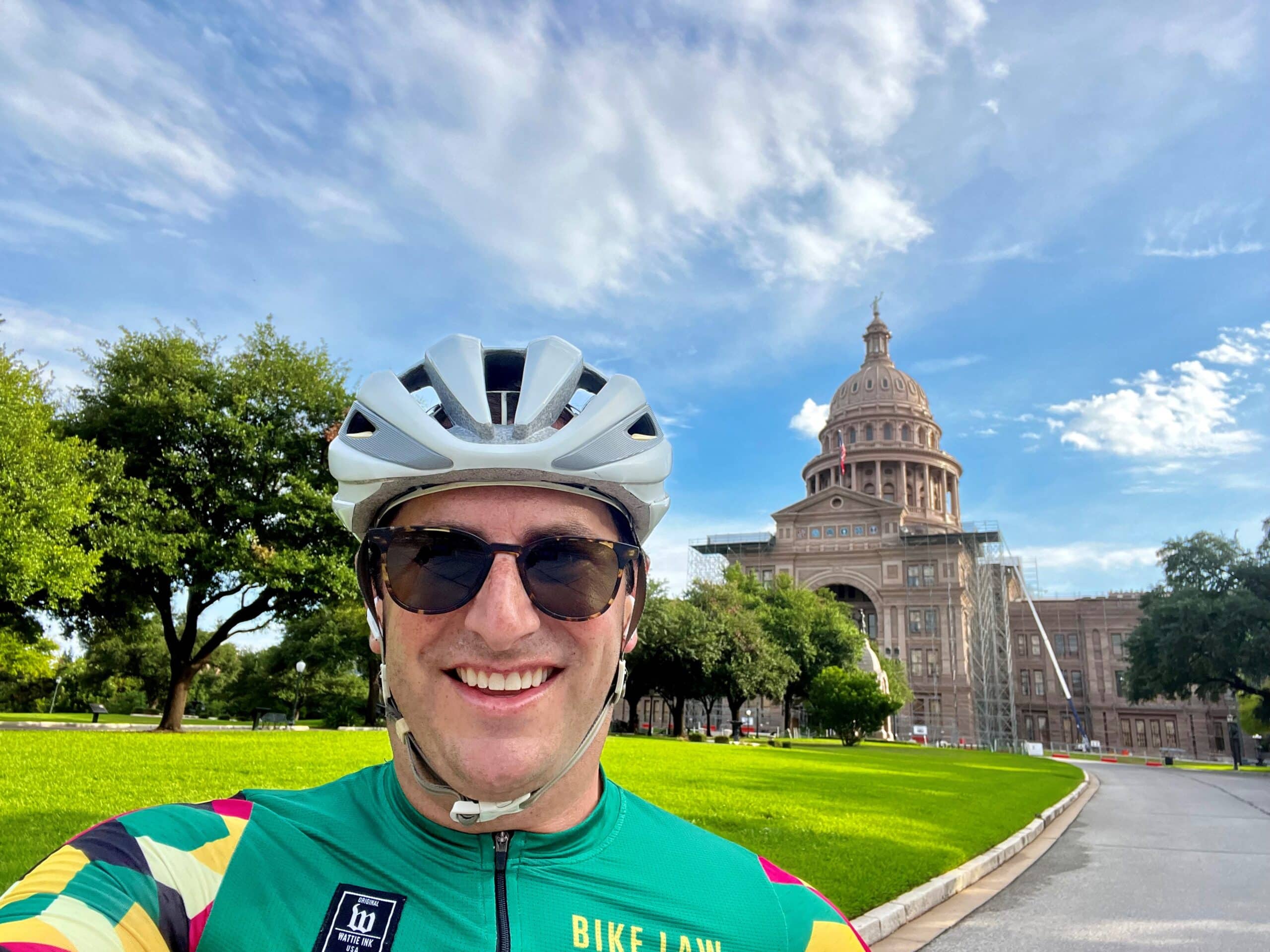Did you know that there are reasons for riding with and without a GoPro or Garmin strapped your ?
With the rise in the use of GoPro cameras, Garmin computers, police cruiser cameras, and smartphones we have been receiving an increasing number of inquiries about constitutional rights, privacy laws and evidentiary issues associated with data kept and recorded on electronic devices. Our Bike Law Maine Lawyer, Lauri Boxer-Macomber, answers some those frequently asked questions below.
Should I ride with a GoPro, Garmin, Cycliq or another bike camera?
This is something to think about. Riding with a camera can be tons of fun and certainly offers you an excellent way to memorialize your riding adventures and share them with others. Further, having a camera on board has the potential to offer you important legal protections, a certain peace of mind, and could even make you a better rider. However, recording devices may detract from the direct enjoyment of a ride, have the potential to be a distraction to you and other traffic, and may record information that may not be helpful or favorable to you or your riding companions.
What are some of the advantages to riding with cameras?
Bicycle cameras and other recording devices may assist injured, damaged and threatened bicyclists to capture helpful evidence and build support for their legal cases. The devices can be particularly helpful in “hit and run” collisions and “no contact” cases (i.e. cases where a bicyclist is forced off the road or into a compromised situation because of a motorist’s negligent driving or dangerous infrastructure). They are also extraordinarily useful as forensic tools in situations where a bicyclist suffers from head injuries and/or other post-crash medical conditions that interfere with his/her ability to recall events leading up to the crash.
Ben Sawyer, who orders merchandise for CycleMania in Portland, Maine, has noticed an uptick in the sale of bike cameras to long distance solo commuters for precisely these reasons. “People want some measure of protection,” says Sawyer, “especially when they are riding alone on rural roads.” John Grenier of Rainbow Bicycle in Lewiston, Maine has also noted that people are purchasing bike cameras from his shop to avoid “he said, she said” disputes and to capture road rage.
Grenier also commented that some of his customers use bike cameras as a means to study race tactics and to teach others about what it is like to ride and race bikes. “They are great tools for civic engagement,” says Grenier.
Bicycle cameras can also help law enforcement officers to enforce laws designed to protect people riding bikes and educate the public about how their driving may be endangering lives. Downeast Racing Rider Matt Robinson, who commutes on his bicycle in northern Maine, recently used the below footage to get a law enforcement officer to follow up with an unwitting driver who made an improper right turn in front of him in violation of 29-A M.R.S.A. § 2060 (1-A).
Similarly, Jim Hettenbach, who is a board member of the Bicycle Coalition of Maine, a Community Cycling Club of Portland (CCCP) rider and a year-round bicycle commuter, recently shared a compilation of commuter footage with law enforcement officers in the Bicycle Coalition of Maine’s Law Enforcement Collaborative to demonstrate the dangers of close passes by motorists of bicyclists and to stress the need for more diligent enforcement of 29-A M.R.S.A. § 2070 (1-A), Maine’s “three feet or more” passing statute, and other laws designed to protect people riding bikes.
When talking to Hettenbach about the pros and cons of riding with a camera, Hettenbach noted that having a camera on his bike has had the secondary benefit of making him a better bicycling commuter and ambassador for the bicycling community. “The camera keeps me in check,” says Hettenbach. “I know that it is recording whether I am following the rules of the road and am more diligent about making sure everything I am doing as a bicyclist is lawful.” In addition, Hettenbach reflects that having a camera around has encouraged him to remain calm in situations where he may have otherwise allowed his frustration with a motorist’s behavior to get the best of him.
What are some of the disadvantages to riding with cameras?
As discussed above, riding with a camera can detract from the quality of your ride and/or may serve as a distraction to you or other traffic. You also need to keep in mind that recorded footage may not always turn out to be favorable to you and/or the people you are riding with and that you may have to turn that footage over to law enforcement, attorneys, the court or others. If there is a crash, collision or another incident, there is a possibility that your bicycle camera footage may become the subject of a subpoena or a court order.
May I use my bike camera or another electronic device to record a conversation with a driver without informing the driver that s/he is being recorded?
It depends on where you are and which laws and regulations govern you at that time and place. Maine is a “one-party consent” state. This means that only one party to a recorded conversation is required to consent to the recording for the recording to be lawful. See together 15 M.R.S.A. § 709 and 15 M.R.S.A. § 710. Maine law is consistent with the federal “Wiretap Act,” 18 U.S.C. § 2510 et seq., which is also designed to protect people’s privacy in their oral, telephonic and other communications with others. That law also requires only that one party to a recorded conversation give consent before a conversation is recorded. See 18 U.S.C. § 2511(2)(d).
Further, there is nothing in the Maine statutes cited above requiring a person recording a conversation to notify the other person(s) participating in the conversation that a recording is being made. So, it is perfectly legal for a bicycle rider in Maine to record his or her conversation with a motorist in Maine on a device like an iPhone or a bicycle camera without asking for the motorist’s permission to record the conversation or informing the motorist of the existence of a recording device.
As Maine bicyclists travel to and ride in other states, it is important to keep in mind that other state laws on recording communications may be different from and/or more restrictive than Maine and federal law. For example, in New Hampshire, all parties to a conversation need to consent to a recording before a recording is made. See N.H. Rev. Stat. Ann. § 570-A et seq. Likewise, the State of Oregon has mixed provisions about the recording of communications that apply different standards to different forms of communications. See Or. Rev. Stat. Ann. § 165.540; Or. Rev. Stat. Ann. § 165.535. Still, other states, like Vermont, have no definitive statutes or case law directly on point.
May I record the conversations of other people at a crash scene?
In Maine, persons who are not parties to conversations are prohibited from recording conversations unless at least one party to the conversation consents to the recording in advance. See together 18 U.S.C. § 2511(2)(d),15 M.R.S.A. § 709 and 15 M.R.S.A. § 710. So, it would be unlawful for a witness to a bicycle crash who is carrying an iPhone or other recording devices to record a conversation between a motorist and the police without first obtaining permission from the motorist or the police. Persons who intentionally or knowingly violate this law could be charged with a class C felony, which is punishable by up to five years in prison. See together 15 M.R.S.A. § 710 and 17-A M.R.S.A. § 1252. Likewise, they could be subject to a civil claim.
May I record heated or threatening communications between another bicyclist and a motorist?
It is unlawful for one bicycle rider to record the conversation of another bicycle rider and a motorist (heated or not) without first obtaining consent from one of the people participating in the conversation. See together 18 U.S.C. § 2511(2)(d), 15 M.R.S.A. § 709 and 15 M.R.S.A. § 710. Note that consent may sometimes be implied by one party. For example, if you point to your camera during the altercation and your fellow bicycle rider understands what you are doing and does not object, a court may find implied consent.
May I record the conversations of other group riders if I am on a group ride?
For the same reasons discussed above, it is unlawful for one group rider to record the conversations of other group riders when not a participant in those conversations. If you plan on using a GoPro, a bicycle camera or another electronic recording device on a group ride, the appropriate protocol is to obtain permission from other riders to record conversations in advance of the ride. Furthermore, if the presence of a camera or recording device is announced before a group ride, riders have the option of proactively authorizing the recording rider to record communications with law enforcement or motorists should the need later arise.
May I record the police?
In general, the First Amendment to the United States Constitution offers broad protections to people who elect to record law enforcement officers acting as public servants and performing their public duties in a public place. In Glik v. Cunniffe, the United States Court of Appeals for the First Circuit ruled that it was not unlawful for a member of the public to openly use his cell phone to record an arrest of another person on the Boston Common. Glik v. Cunniffe, 655 F.3d 78 (1st Cir. 2011). The Glik Court keenly observed that “[t]he proliferation of electronic devices with video-recording capability means that many of our images of current events come from bystanders with a ready cell phone or digital camera rather than a traditional film crew, and news stories are now just as likely to be broken by a blogger at her computer as a reporter at a major newspaper.” Id at 655 F.3d at 84. However, the Court went on to note that the right to record police in public places is limited by the First Amendment’s usual “reasonable time, place, and manner restrictions.” See Glik, 655 F.3d at 84 (citing Smith v. City of Cumming, 212 F.3d 1332, 1333 (11th Cir. 2000). In addition, in the State of Maine, Maine’s one-party consent law, which requires consent from at least one party to a conversation before a recording is made, must also be taken into consideration before recording the conversations between the police and others. See 15 M.R.S.A. § 709 and 15 M.R.S.A. § 710.
May the police and others record me?
In general, when you are riding your bicycle in public and/or are out in public, you should assume that you may be photographed or recorded by the police and/or others. It is not uncommon or unlawful for the police to record bicycle traffic and other traffic. Law enforcement officers often wear chest cameras or use cruiser cameras when responding to crashes, complaints or incidents. Similarly, it is common for people to use their iPhones or other devices to record others in public places. The consent laws discussed above apply to your conversations the same way that they apply to the conversations of others. You will always want to be careful about what you say to the police and others at a crash scene or during a traffic stop, as someone could very well be recording your statements without the recording device being obvious to you.
If I am involved in a crash or an incident, am I required to turn footage and recordings within my possession over to the police?
In most situations, the Fourth Amendment to the United States Constitution protects your right to privacy and prevents law enforcement officers from viewing, listening to and/or searching your electronic devices without a search warrant, subpoena, court order or your permission. Although a law enforcement officer may ask whether you have and/or are willing to turn over footage or recordings, you generally are not required to consent to such a request and may wish to talk to counsel before doing so. This is so even if you believe that the recordings and/or footage within your possession will help your case or someone else. However, where “exigent circumstances” exist, and an officer believes that a recording or footage in your possession might contain evidence of a crime, the officer may have the right to lawfully seize your device(s) to prevent the destruction and/or loss of evidence. Still, the device(s) may not be searched, viewed and copied by law enforcement or anyone else without law enforcement first obtaining proper legal authority.
Is GoPro, iPhone, bike camera and other footage admissible evidence in court?
The admissibility of data recorded on electronic devices depends on its relevance, authenticity, reliability and credibility. Establishing the chain of custody of electronic data is critical, as is demonstrating its integrity. If you intend to use bike camera footage, iPhone videos and/or other electronic data to prove your case, it is recommended that you obtain assistance from a qualified bicycle attorney familiar with your recording device(s) and the applicable rules of evidence. Likewise, if you are trying to keep recordings or footage out of court, it is advisable that you consult with qualified counsel to assist you with that effort.
Important Note
Because of the highly circumstantial nature of most cases, and because most questions require a combined review of federal, state and local laws and regulations, the general information contained in this post should not be construed as legal advice. Should you have questions about a specific case or incident in the State of Maine, contact Lauri Boxer-Macomber at [email protected]. Likewise, if you have questions about how these laws work in your state or a state where you will be riding, or have ridden, locate a bike law attorney in that area.

Lauri Boxer-Macomber has been an avid rider for decades. Lauri’s Maine law practice is focused on advocating for the rights of bicyclists, pedestrians, and other vulnerable road users.
Lauri’s riding experience and legal training are complemented by her advocacy work. She is an active Board Member of the Bicycle Coalition of Maine, a Governor of the Maine Trial Lawyers Association, and a Member of the American League of Bicyclists. She also chairs the Bicycle Coalition of Maine’s Policy and Legislation Committee and is one of the founding members and facilitators of the Bicycle Coalition of Maine’s Law Enforcement Collaborative, a group of law enforcement officers, planners, bicycle advocates, and others who meet regularly with the goal of improving safety on Maine’s roadways.








